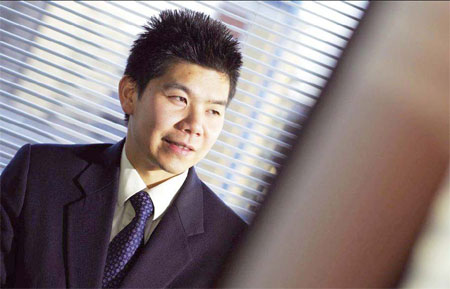Europe courts Chinese firms in dispute
Updated: 2012-12-07 09:06
By David Bartram (China Daily)
|
|||||||||||
|
Josh Wong, a lawyer at DLA Piper advises both Chinese and European companies on arbitration proceedings in London rather than at a domestic court. Photo Provided to China Daily |
Law firms promote London, Paris, stockholm as best places for trade arbitration
China's growing demand for legal services is sparking a scramble as Europe tries to sell itself as the courtroom of the world.
With China playing an ever greater role in global trade, the long-time centers of international dispute resolution in London, Paris and Stockholm are appealing to Chinese companies seeking arbitration in Europe.
Britain's Justice Secretary Kenneth Clarke last year spoke of his determination to turn the UK into the "lawyer and adviser to the world".
|
|
|
Brenda Horrigan says Stockholm used to be the choice for many planned economies. Photo Provided to China Daily |
There is, however, plenty of competition, not only from other European countries but also the US and emerging Asian cities like Singapore and Hong Kong.
"London, Paris and Stockholm, as well as the Swiss cities like Zurich and Geneva, are often agreed to by Chinese parties as seats of arbitration," says Matthew Townsend, director of the China Britain Law Institute and an arbitration specialist at the law firm Fulbright & Jaworksi.
"All are arbitration-friendly with judiciaries that are reluctant to interfere with or delay proceedings."
Since China ratified the New York Convention in 1987, arbitration rulings in countries that are also signatories have been enforceable in China. The venue of any arbitration hearing must be agreed to by both parties, and is usually written into contracts during negotiations.
"The starting point is the stage where the Chinese party and the other party, usually Western, are agreeing a contract for services, or sourcing and manufacturing a product," says Josh Wong, a lawyer at DLA Piper, who has advised both Chinese and European companies on arbitration proceedings in London.
"At that point they have to agree that disputes will be resolved by arbitration rather than a domestic court. They then agree the terms of the arbitration clause in the contract. The clause will specify details such as which arbitration body the parties will use to resolve any dispute, as well as the location and language of the proceedings."
Although Europe is rarely the first choice for a Chinese company, it is becoming a popular compromise location, especially in disputes between Chinese and US parties, says Juliet Blanch, a partner at Weil, Gotshal & Manges.
"It is more a case of the bargaining strength of the parties," she says. "A Chinese party would naturally prefer to have their dispute heard in the China International Economic and Trade Arbitration Commission in Beijing.
"But let us suppose there is a dispute between an American and a Chinese party. The American party will say they don't feel comfortable having a dispute against a Chinese party being heard by a Chinese institution in China. But equally the Chinese party will have the same objection when the American suggests New York.`
"The appeal of London, Paris and Stockholm is that they are seen by both parties as good neutral venues that will remain impartial and can be trusted. They are all jurisdictions that understand transactions between East and West. They understand the Chinese mentality as well as the Western mentality."
Stockholm, in particular, has a long history of arbitrating trade disputes between East and West. The arbitration institute at the Stockholm Chamber of Commerce dealt with many disputes between companies from the Soviet Union and the United States during the Cold War.
"Traditionally, Stockholm was the place of choice for Chinese parties, and actually for most parties from planned economies," says Brenda Horrigan, a partner at Herbert Smith and a dispute resolution expert based in Shanghai. "It was viewed as neutral by both parties and had a body of arbitrators that was used to dealing with companies from those jurisdictions.
"But that is changing. Stockholm is still a seat for arbitration but Chinese companies with negotiating power are increasingly trying to get the arbitration either in China or closer to China; say, Hong Kong or Singapore."
In response, Stockholm and the other European arbitration centers are launching a marketing offensive across China, looking to persuade the growing number of Chinese companies involved in international trade that Europe is the place to resolve a dispute.
"The European institutions see the growth in arbitration in Asia and are working to keep their market share," Horrigan says. "They are doing seminars, joint programs with Chinese institutions such as CIETAC, and taking other steps to maintain visibility."
Last year, Townsend's CBLI hosted an event in Beijing focusing on international arbitration. As well promotional tours, some of the major seats, such as the International Court of Arbitration in Paris, are building concrete links with Asia by opening offices in Hong Kong and Singapore.
"The realization from the arbitration community in Europe is that in the next few years we are likely to see an increasing number of disputes between Chinese companies and their European counterparts, some with potentially huge amounts of money involved," Wong of DLA Piper says.
"This is because relationships between European companies and their Chinese partners are now maturing. We are past the initial establishment phase in many of these relationships.
"Many Sino-UK joint ventures are at least 10 years old now, and commonly this is the time that difficult issues start emerging and it becomes much more difficult to resolve disputes without recourse to arbitration.
"With the economy in Europe not being so strong and the Chinese economy starting to slow down, this brings further pressure on relationships, and parties are more inclined to instruct lawyers to enforce their legal rights. Clearly if Chinese parties are comfortable with resolving their disputes in Europe, it will be a big boost for the legal industry here."
Wong has personally worked on such disputes. Although arbitration hearings remain confidential, he outlines the case of a Chinese State-owned chemical company that invested in an English chemical company. When a dispute occurred over an acquisition agreement, the company agreed to a London-based arbitration.
"The reason my Chinese clients agreed to London was because they were investing in an English company under English law, and they would be sending staff over to England from China to help run the business anyway," Wong says.
The London Court of International Arbitration is also taking steps to better accommodate Chinese parties. In Wong's case, the court held several of the preliminary hearings by telephone and video conference call, as well as allowing the use of translators where necessary, saving Chinese witnesses the time and expense of traveling to Europe.
"My Chinese clients were also impressed that there were LCIA arbitrators to choose from who had relevant experience in China. They appreciated arbitrators who had spent time in China and had an understanding of Chinese business culture. They were very happy with the way the hearing went."
Companies arbitrating abroad now have more confidence that any rulings will be enforced in China. Although the New York Convention assures this in theory, there have been problems in practice. But this is improving, says Horrigan from Herbert Smith in Shanghai.
"China has taken a number of steps to improve the enforcement record. One of the important ones, imposed several years ago, is that for awards rendered outside of China or foreign-related awards rendered in China, a local court can no longer refuse enforcement without getting permission from its superior. It is a strong disincentive to refuse enforcement."
This improved enforcement, combined with the successful experiences of a number of Chinese parties in Europe, should encourage other Chinese companies to resolve disputes in Europe, something that could hold wider benefits for the European legal industry.
"There is a huge opportunity, not just for the arbitration institutions but for the legal community as a whole," says Blanch at Weil, Gotshal & Manges.
"What we need to sell isn't just an arbitration seat in London or Paris or Stockholm. We need to tell companies in China that we can help with their disputes wherever and whatever they are."
For China Daily
(China Daily 12/07/2012 page19)
Today's Top News
Rescuers race against time for quake victims
Telecom workers restore links
Coal mine blast kills 18 in Jilin
Intl scholarship puts China on the map
More bird flu patients discharged
Gold loses sheen, but still a safe bet
US 'turns blind eye to human rights'
Telecom workers restore links
Hot Topics
Lunar probe , China growth forecasts, Emission rules get tougher, China seen through 'colored lens', International board,
Editor's Picks

|

|

|

|

|

|







